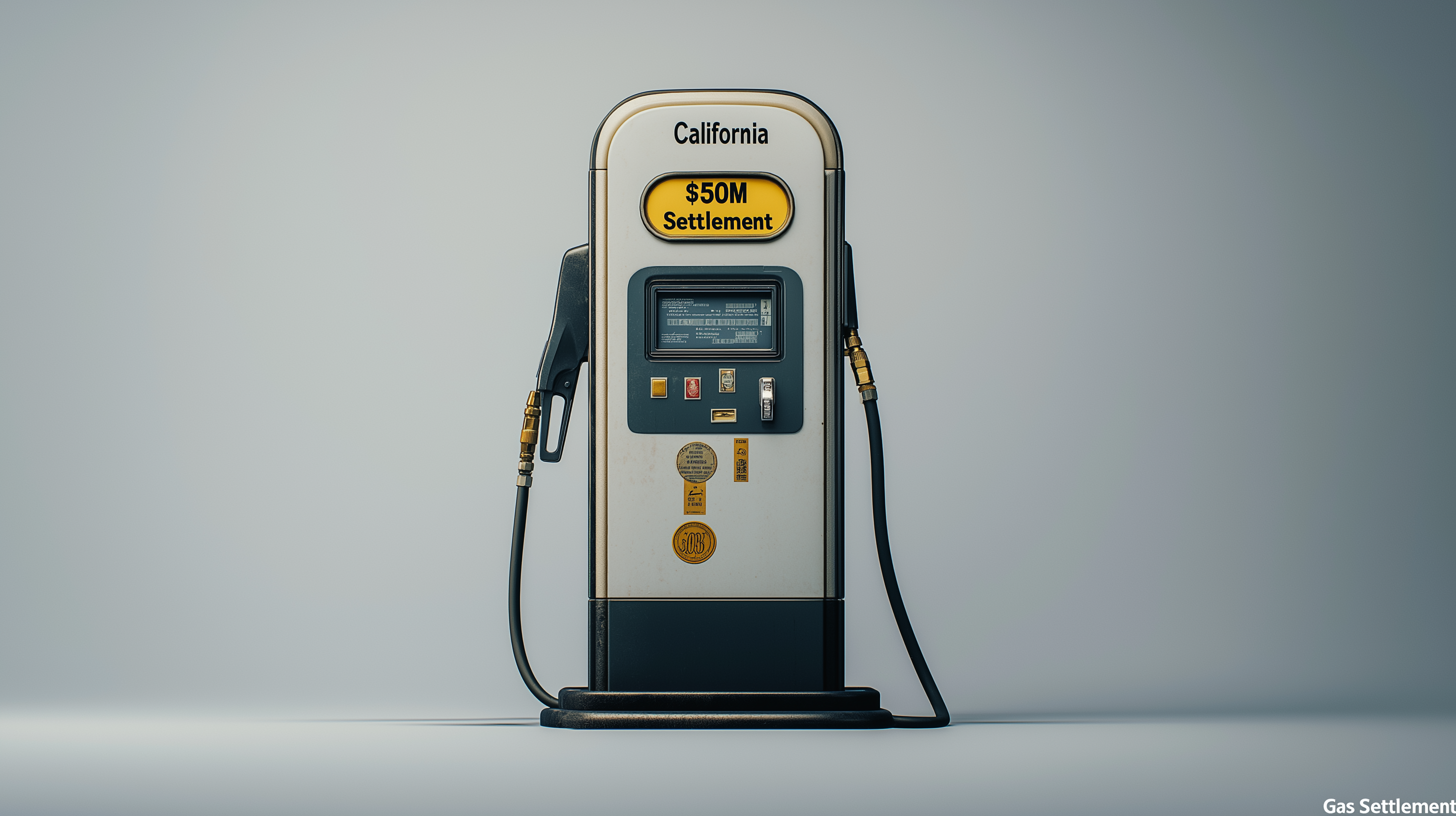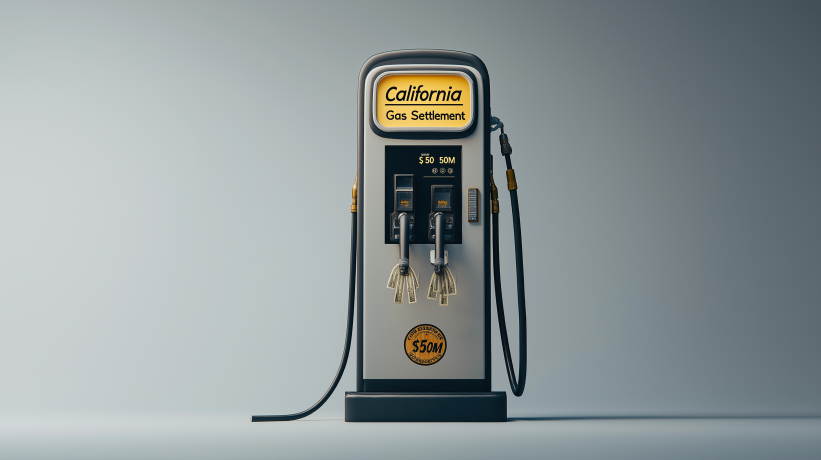
California residents who purchased gasoline in Southern California between February and November 2015 may be eligible for a payment from a $50 million class action settlement. The lawsuit alleged price-fixing by major gas companies, and eligible consumers can now file claims for their share of the settlement funds.
by LawInc Staff
October 8, 2024
If you’re a California resident who purchased gasoline at retail between February 15 and November 10, 2015 in Southern California, you may be entitled to payment from a $50 million class action settlement. Here’s what you need to know about the case and how to claim your share.
The Lawsuit
-
- Parties: The California Attorney General sued Vitol Inc., SK Energy Americas, Inc., and SK Trading International (the “Defendants”) on behalf of California consumers.
- Allegations: The AG alleged Defendants conspired to increase gasoline prices, violating California’s antitrust and unfair competition laws, causing consumers to overpay.
- Relevant Laws: The Cartwright Act prohibits price fixing and the Unfair Competition Law bans any unlawful, unfair or fraudulent business act.
- Defendants’ Position: The Defendants deny any wrongdoing and maintain they followed the law, but agreed to settle to avoid further litigation.
- Settlement: Defendants will pay $50 million to resolve the case – $37.5M to consumers and $12.5M in civil penalties, without admitting liability.
The Cartwright Act is California’s primary antitrust law (similar to the federal Sherman Act). To violate this law:
-
- Two or more persons or companies must enter into an agreement (conspiracy)
- To restrain trade or commerce (such as fixing prices)
- That agreement must have an anticompetitive effect
- Causing economic injury to consumers or competitors
Here, the AG alleged Defendants conspired to manipulate gas prices, restrain trade, and overcharge California drivers.
The UCL prohibits any “unlawful, unfair or fraudulent business act or practice.” Each prong works differently:
-
- Unlawful: The UCL borrows violations of other laws and makes them independently actionable. So a Cartwright Act violation is also “unlawful” under the UCL.
- Unfair: Conduct that violates antitrust policy or the spirit of antitrust laws or significantly threatens competition may be “unfair,” even if not unlawful.
- Fraudulent: Conduct is “fraudulent” if members of the public are likely to be deceived. Intent to deceive is not required.
The AG alleged Defendants’ conduct was unlawful (a Cartwright Act violation), unfair (threatened competition), and fraudulent (likely to deceive consumers).
Settlement Eligibility & Benefits
-
- Eligible Class: Natural persons who resided in CA and purchased gasoline at retail in Los Angeles, Orange, San Diego, Riverside, San Bernardino, Ventura, Santa Barbara, San Luis Obispo, Kern, or Imperial counties between 2/18/15-11/10/15.
- Individual Payments: Class members who file a valid claim will receive an equal portion of the $37.5M settlement fund after deducting taxes, administration costs, and attorneys’ fees.
- Penalty Fund: The $12.5M civil penalty payment will fund future enforcement of CA consumer protection laws by state and local government.
- Claim Process: File a claim online at CAGasLitigation.com or print and mail a form by 1/8/25. No proof of purchase needed.
- Other Options: Exclude yourself to retain the right to sue separately or object to the settlement terms. Do nothing and you get no payment.
A class action allows a person or small group (the “class representatives”) to sue on behalf of themselves and other similarly situated people (the “class”). This avoids thousands of individual lawsuits on the same issue.
Class actions must meet certain requirements:
-
- Numerous class members, making individual suits impractical
- Common questions of law or fact among all class members
- Class representatives have claims typical of the class
- Representatives will fairly and adequately protect class interests
Here, millions of Californians potentially overpaid for gas, making a class action the most efficient way to resolve their claims.
The Attorney General can file lawsuits on behalf of the People of the State of California to enforce state laws and protect the public. This includes:
-
- Antitrust actions under the Cartwright Act and Unfair Competition Law
- Parens patriae suits on behalf of state residents harmed by violations
- Civil law enforcement actions seeking injunctions, restitution and civil penalties
- Representing state agencies in litigation to protect the public
The AG used this broad authority to sue Defendants for antitrust violations on behalf of California consumers and the general public.
FAQs
Common Questions about the Settlement
-
- How much will class members receive? It depends on the number of valid claims filed, but likely between $50-$100 each.
- When will I get my payment? Checks should go out within 90 days after the settlement is finally approved, which could be late 2025 or 2026 depending on any appeals.
- What if I don’t want to be part of the settlement? You must exclude yourself by 1/8/25 or you give up your right to sue Defendants separately for the same claims.
- How do I object to the settlement? Write to the Court by 1/8/25 explaining what you don’t like about the settlement terms. The judge will consider your objection.
- What businesses are covered? None – this case only involves individual California consumers. Businesses have a separate settlement for their claims.
Key Takeaways
This settlement is a big win for California drivers who paid inflated gas prices in 2015 due to alleged illegal conduct by Defendants. The Attorney General used his broad powers to hold companies accountable and recover money for consumers and the state.
Even without proof of purchase, California residents can get a cash payment by filing a simple claim. Be sure to submit your claim by the January 2025 deadline, and watch for your payment if the settlement is approved!
For more info and updates, visit https://vlc.calgaslitigation.com/.
Need Legal Help?
If you need legal assistance, in any field of law, our free concierge service can connect you with experienced attorneys in any practice area and state. Contact us to learn more.
Also See
Exposed: Data Broker NPD Sued for Massive Breach Endangering 2.9 Billion People’s Identities
Brain Data Not for Sale in California: How SB 1223 Safeguards Your Neural Privacy
Peacock Plucked: Claim Your Share of the $3.74 Million Auto-Renewal Settlement










